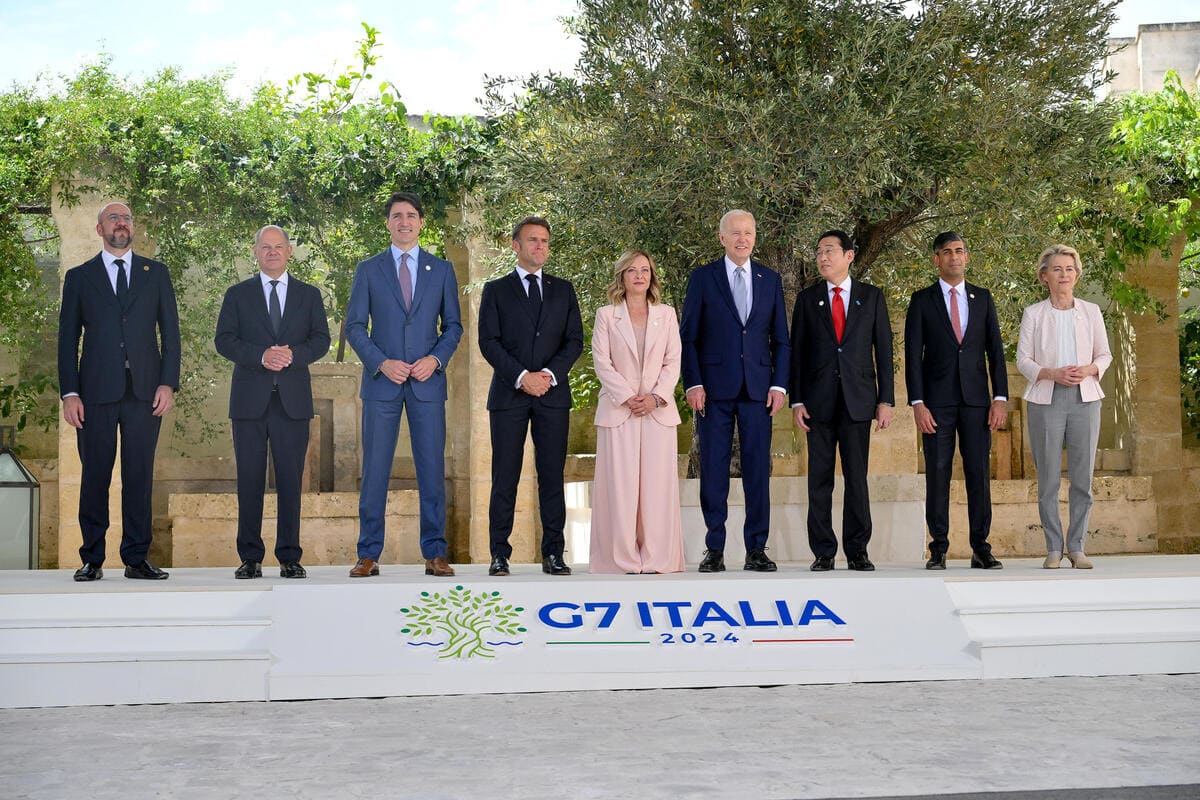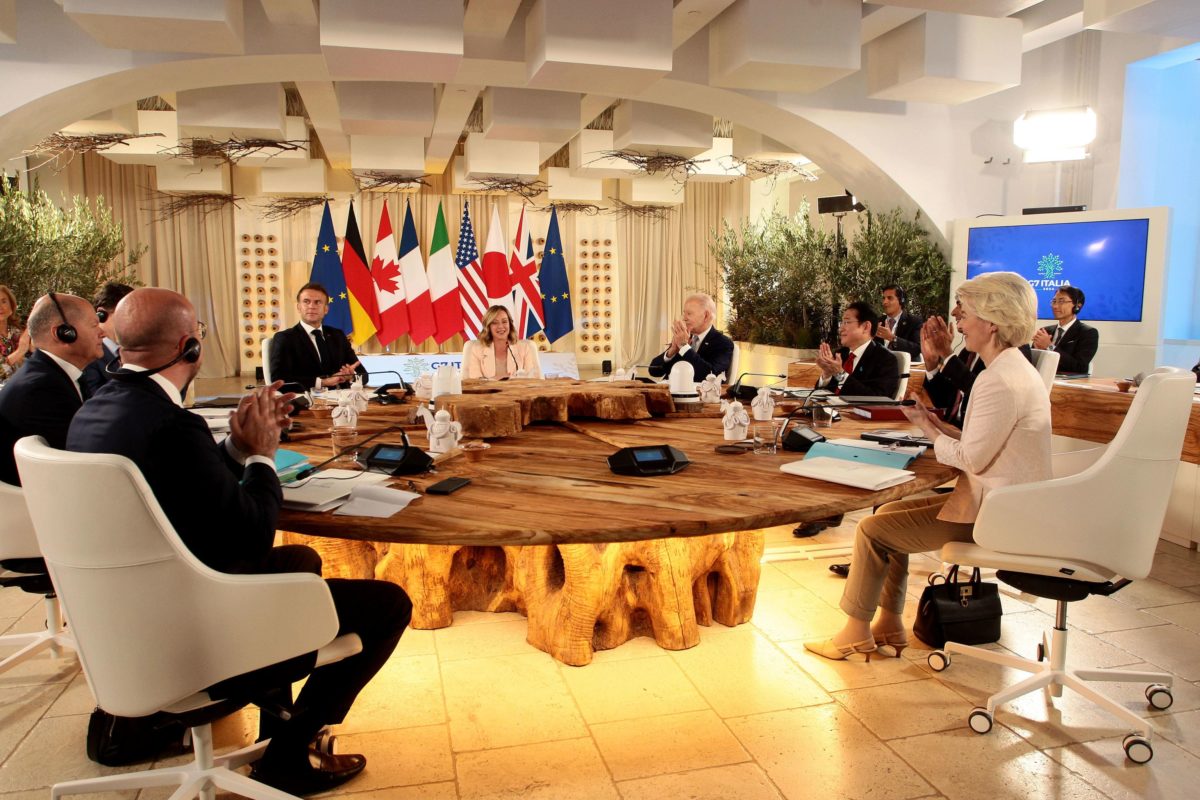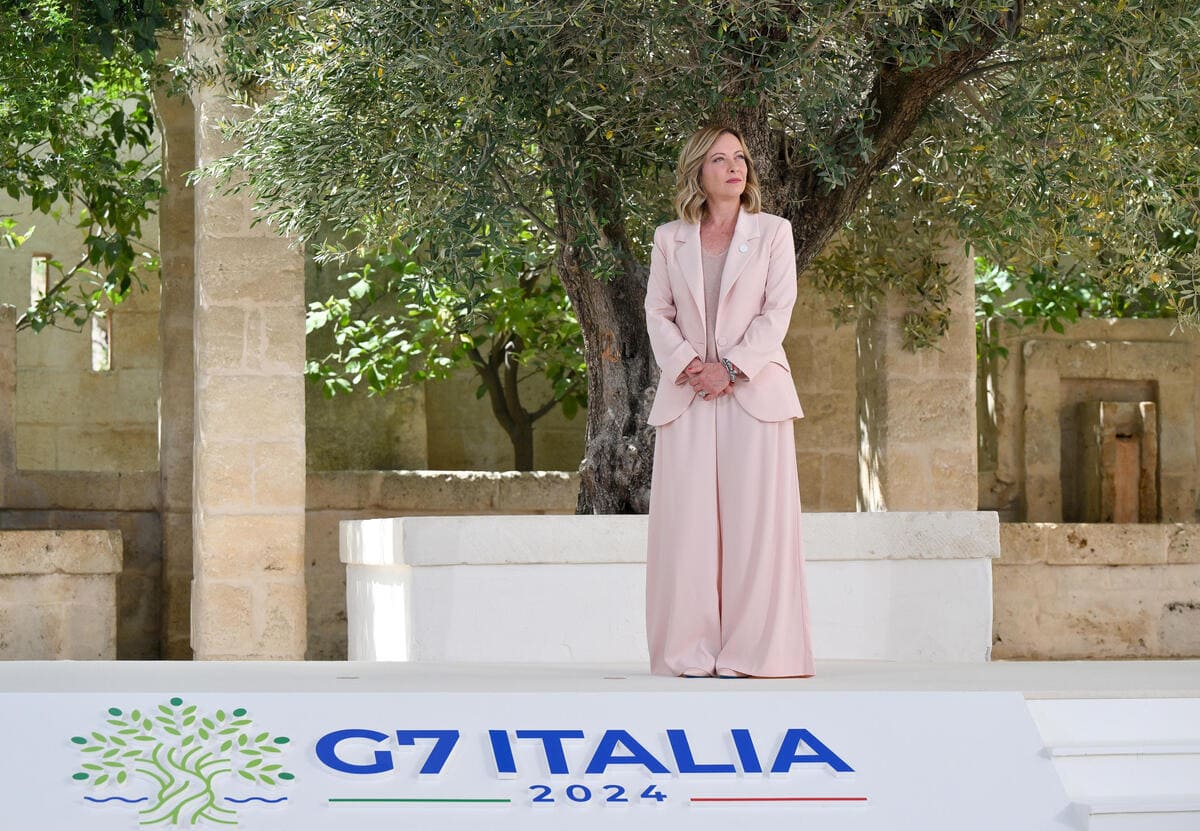
Yesterday, the Italian-led G7 summit opened in Borgo Egnazia, Puglia, and there were many news stories to cover and one non-story that made headlines. Guess which one some major Italian newspapers chose to put on their front pages yesterday morning? Exactly.
Let’s take a look. Repubblica on the front page: “G7 divided on abortion,” with additional pages inside reporting the dismay of “alarmed Japanese journalists” questioning: “Do we really want to take such a step back in time? What is happening in Italy?”. An interview with Pina Picierno, vice president of the European Parliament, who argues that the Meloni government “wants to limit a fundamental right.”
La Stampa on the front page: “G7, the first clash is about abortion,” followed by two full pages detailing the controversy, including comments from MP Alessandro Zan, responsible for PD rights: “This is the G7, not Atreju. Using the Italian presidency of the most important intergovernmental forum to attack women’s rights is very serious. This G7 is starting in the worst possible way for Italy and its credibility.” Commentary by Annalisa Cuzzocrea: “You can’t be among the G7 countries if you have, on rights issues, positions like Orban’s. This is what France, Canada, and EU institutions are trying to convey to the Meloni government. And this is the heart of what happened yesterday.”
Il Fatto: “Giorgia tries to attack: abortion removed from the G7 document.”
At least Corriere della Sera was more subdued. The headline discussed “Agreement at G7: 60 billion from Russian funds to Kiev,” and mentioned “tension on abortion” in a couple of lines within the article.

On International Headlines
Before delving into the details, let’s see how some of the world’s most important newspapers covered the G7 summit yesterday. The Guardian: “United States and Ukraine sign decade-long security agreement.” Cnn: “Biden gives new impetus to consolidate the western Ukrainian effort against Putin – and Trump.” The New York Times: “Weak Western leaders meet in Italy to discuss an undisciplined world.” Le Monde: “War in Ukraine: eight EU countries want to limit travel of Russian diplomats.” Financial Times: “G7 reaches ‘provisional’ agreement on a $50 billion loan to Ukraine.” The abortion issue that caused a stir among Japanese correspondents is not even mentioned or downplayed as a second-tier news.
There were many news stories to cover and one non-story. Greater emphasis could have been placed on the summit’s topics, especially regarding the war in Ukraine, or discussions about Africa and migration, the Middle East, and artificial intelligence with the first-ever visit of a Pope to a G7 summit. Instead, the main news for major Italian newspapers was about abortion.

An Off-Agenda Issue
Efforts were made to spoil Giorgia Meloni’s success at this summit, as even Politico acknowledged: “Six lame ducks and Meloni meet at the 2024 G7.” In the absence of other news, the focus was directed towards a non-story, a “false alarm,” as Il Foglio described it, the only outlet to explain how a storm was created in a teacup.
What happened was that a rumor started circulating that the sherpas of the various governments tasked with preparing the final summit statement had discussed the “right to abortion.” At the G7 in Hiroshima in May 2023, participants agreed to “ensure complete sexual and reproductive health and rights for all, including addressing the issue of access to safe and legal abortion and post-abortion care.” French diplomats insisted on explicitly stating the intention to “promote” abortion in the new formulation, while the Italians opposed this, arguing that it would be better to “incorporate the commitment to integrate abortion rights with prevention policies” into the text.
Regardless of one’s stance on abortion (and you know ours), it’s clear that this is a marginal issue compared to the main topics discussed, not on the agenda of participants, and revolves around what wording – however silly we find it – to use in press releases that only insiders read.
What Alarm? What Clash?
We’re talking about nothing, a “false alarm,” a non-news story used to distract readers who, pardon the readers of Stampa and Repubblica, are treated like fools to whom, for the modest sum of 1 euro and 70 cents, their daily democratic alarm is given. They are led to believe that among the olive trees of Borgo Ignazia, all that was discussed was abortion, instead of wars, migrations, and artificial intelligence.
In the usual mix, from Minister Roccella’s positions to the amendment on family planning clinics (the primary sponsor, Lorenzo Malagola, explained well on Tempi what happened), and LGBT rights, an attempt is made to portray the leaders of the free world all pointing fingers to lecture the ministers of our government. As if in Italy, there isn’t already a law, Law 194, regulating abortion since 1978.
However, for them, it is an “alarm,” it is a “clash,” and “the G7 risks derailing.” The only thing that has gone off track is the intellectual honesty of those who, in order to acknowledge any success at the event and to sabotage any agreement on future European appointments, resort to every stratagem as a weapon of mass distraction. Now that the issue has been raised, rest assured that the hammering will continue – yesterday it began by collecting Emmanuel Macron’s “regret” – until the “non-story” becomes “news.”



